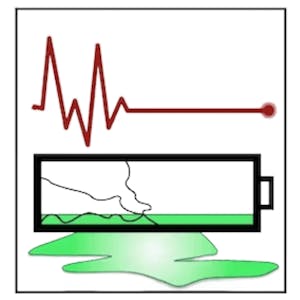Battery State-of-Health (SOH) Estimation is a comprehensive course designed to equip learners with the skills to implement state-of-health (SOH) estimators for lithium-ion battery cells.
This course provides a solid foundation for understanding the complexities of battery health estimation and is suitable for individuals interested in electrical engineering, battery technology, and energy storage systems.
Certificate Available ✔
Get Started / More Info
Battery State-of-Health (SOH) Estimation comprises modules covering degradation mechanisms, capacity estimation methods, parameter estimation, and practical implementation using Octave/MATLAB scripts.
Module 1 introduces the primary degradation mechanisms in lithium-ion cells, covering negative and positive electrode aging processes, sensitivity of cell voltage to changes in equivalent series resistance (ESR) and total capacity, and the tradeoffs between joint and dual estimation of state and parameters.
Module 2 delves into total-least-squares battery-cell capacity estimation, exploring the limitations of ordinary least squares, computational efficiency, weighted total-least-squares solution, confidence intervals, and benchmark solutions.
Module 3 focuses on simplified total-least-squares battery-cell capacity estimates, addressing cases with proportional uncertainties, computational efficiency, defining geometry for approximate full solution to weighted total least squares, and faded memory.
Module 4 teaches learners how to write code for different total-capacity estimators using Octave, with demonstrations for hybrid electric vehicle (HEV) and battery electric vehicle (BEV) scenarios.
Module 5 covers a Kalman-filter approach to total capacity estimation, including the derivation of methods for parameter estimation, estimation of states and parameters simultaneously, and addressing issues of robustness and speed.
Module 6 involves a capstone project where learners can apply their knowledge in a practical setting, integrating the concepts and techniques learned throughout the course.
A Practitioner's Approach to Power Distribution & Automation is a comprehensive course covering electrical power distribution and medium voltage (MV) substation...
Advance your skills in power electronics with a focus on modeling and control of high-performance power converters like dc-dc, ac-dc, and dc-ac. Master design-oriented...
High Voltage Schottky and p-n Diodes is a comprehensive course focusing on the semiconductor physics, characteristics, and modeling of high-voltage Schottky and...
Optique non-linéaire explores laser-matter interaction using intense lasers, such as femtosecond lasers. Gain insights into nonlinear optics phenomena and their...